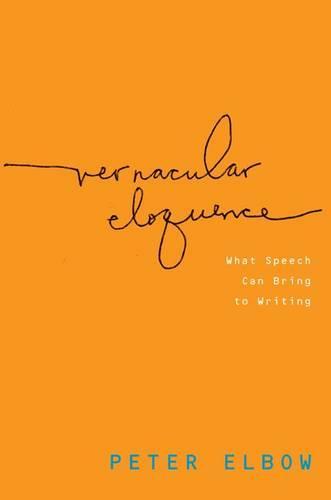Overview
Since the publication of his groundbreaking books Writing Without Teachers and Writing with Power, Peter Elbow has revolutionized how people think about writing. Now, in Vernacular Eloquence, he makes a vital new contribution to both practice and theory. The core idea is simple: we can enlist virtues from the language activity most people find easiest-speaking-for the language activity most people find hardest-writing. Speech, with its spontaneity, naturalness of expression, and fluidity of thought, has many overlooked linguistic and rhetorical merits. Through several easy to employ techniques, writers can marshal this ""wisdom of the tongue"" to produce stronger, clearer, more natural writing. This simple idea, it turns out, has deep repercussions. Our culture of literacy, Elbow argues, functions as though it were a plot against the spoken voice, the human body, vernacular language, and those without privilege-making it harder than necessary to write with comfort or power. Giving speech a central role in writing overturns many empty preconceptions. It causes readers to think critically about the relationship between speech, writing, and our notion of literacy. Developing the political implications behind Elbow's previous books, Vernacular Eloquence makes a compelling case that strengthening writing and democratizing it go hand in hand.
Full Product Details
Author: Peter Elbow (Professor of English Emeritus, Professor of English Emeritus, University of Massachusetts, Amherst)
Publisher: Oxford University Press Inc
Imprint: Oxford University Press Inc
Dimensions:
Width: 15.50cm
, Height: 3.30cm
, Length: 23.10cm
Weight: 0.590kg
ISBN: 9780199782512
ISBN 10: 0199782512
Pages: 456
Publication Date: 23 February 2012
Audience:
College/higher education
,
Postgraduate, Research & Scholarly
Format: Paperback
Publisher's Status: Active
Availability: To order

Stock availability from the supplier is unknown. We will order it for you and ship this item to you once it is received by us.
Reviews
Elbow is his own best argument for speaking onto the page: His voice is both authoritative and affable, conversational and professorial. Erin McKean, International Herald Tribune
""Elbow is his own best argument for speaking onto the page: His voice is both authoritative and affable, conversational and professorial."" --Erin McKean, International Herald Tribune ""it is written in [the author's] wonderfully approachable, affable voice; it emphasizes the need to indulge one's own impetus when writing, to pour oneself into ""freewrites"" ... The book is organized in a unique and purposeful manner ... Highly recommended."" --E. McCourt, Jacksonville University, CHOICE ""...[S]urely some of the best work [Elbow] has done in his long and brilliant career....Elbow's book talks the talk and walks the walk: it is itself a demonstration of his subtitle--what speech can bring to writing....Bravo to Peter Elbow for this learned, provocative, and forward-looking book."" --Andrea A. Lunsford, award-winning author of The St. Martin's Handbook ""Whether you aim to improve your own writing, help others improve theirs, understand more about written language, or just want to enjoy enthusiastic, passionate writing at its best, this book is for you. With a disarmingly simple thesis about what spoken language contributes to writing, Vernacular Eloquence makes major contributions to theory and to practice."" --David Barton, author of Literacy: An Introduction to the Ecology of Written Language ""What a wonderful, enticing book! As only he can, Peter Elbow explores the intricate relationship between speech and writing with broad learning, bold thinking, and a finely tuned sensibility."" --Mike Rose, author of An Open Language: Selected Writing on Literacy, Learning, and Opportunity ""English and speech-communication educators, linguists, cognitive psychologists, and writers will find this book is filled with a multitude of insightful ideas for application--and scholarly research."" --Rosalind Horowitz, editor of Talking Texts: How Speech and Writing Interact in School Learning ""This title should greatly interest English language and linguistics scholars and teachers. Any readers willing either to dig deep or skim and skip will also find fresh ideas and renewed energy for writing."" --Library Journal ""More philosophically rigorous, more historically nuanced, and more socially engaged...and...still delivers the sort of deeply refreshing, commonsensical, practical wisdom about the writing process that has become synonymous with his name."" --Rhetoric Review
<br> Whether you aim to improve your own writing, help others improve theirs, understand more about written language, or just want to enjoy enthusiastic, passionate writing at its best, this book is for you. With a disarmingly simple thesis about what spoken language contributes to writing, VernacularEloquence makes major contributions to theory and to practice. --David Barton, author of Literacy: An Introduction to the Ecology of Written Language<p><br> What a wonderful, enticing book! As only he can, Peter Elbow explores the intricate relationship between speech and writing with broad learning, bold thinking, and a finely tuned sensibility. --Mike Rose, author of An Open Language: Selected Writing on Literacy, Learning, and Opportunity<p><br>
Elbow is his own best argument for speaking onto the page: His voice is both authoritative and affable, conversational and professorial. * Erin McKean, International Herald Tribune *
Author Information
Peter Elbow is Professor of English Emeritus at the University of Massachusetts at Amherst and former director of its Writing Program. He is the author of Writing Without Teachers, Writing With Power, Embracing Contraries, and Everyone Can Write.




